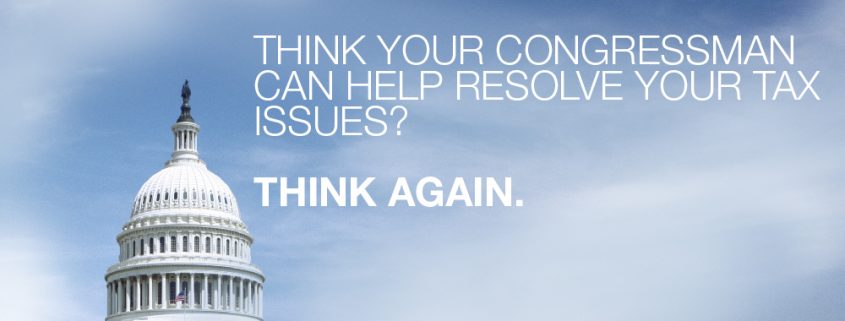Why Contacting Your Congressman Will Usually Never Help You Resolve Your Tax Problems
Although being a constituent of your elected Congressman gives you reason to voice your concerns about agenda under your Congressman’s consideration, don’t think that just because you have personal tax problems that your Congressman will come to the rescue or be able to cut any bureaucratic tape.
It is true that every elected official has employees who do what is known as constituent service, helping people with thorny problems that may involve a federal agency. Most often, the problems they hear involve Social Security benefits, federal disability filings, veterans’ benefits and mortgage issues. Immigration requests involving small-business employees and newly married couples are common, too. But when it comes to the Internal Revenue Service, your Congressman’s office will typically hand off you compliant or problem to the Office Of The Taxpayer Advocate for further processing and stay out of the loop.
Taxpayer Advocate Service
Congress created the Taxpayer Advocate Service in 1996 so for at least one thing that Congressman would not need to deal with their constituents’ tax problems directly. You do not need to go through your Congressman to get to the Taxpayer Advocate Service but there are some important things and limitations you should be aware if you choose to contact the Taxpayer Advocate Service directly.Each state has at least one Local Taxpayer Advocate who is independent of the local IRS office and reports directly to the National Taxpayer Advocate. In California the offices at located in Fresno, Laguna Nigel, Los Angeles, Oakland, Sacramento, San Diego and San Jose.
Twice a year the National Taxpayer Advocate will independently submit reports to Congress.The first report, due by June 30, contains the objectives of the Taxpayer Advocate for the coming fiscal year (starting October 1). The second one, due by December 31, reports on activities of the Taxpayer Advocate during the fiscal year, including his or her initiatives to improve taxpayer services and IRS responsiveness, and a summary of at least 20 of the Most Serious Problems facing taxpayers.The National Taxpayer Advocate delivers these reports to the Senate Committee on Finance and the House Committee on Ways and Means with no prior review or comment from the Commissioner, the IRS Oversight Board, the Secretary of the Treasury, any other Treasury officer or employee, or the Office of Management and Budget.
Here are three things every taxpayer should know about the Taxpayer Advocate Service:
- Although the Taxpayer Advocate Service is an independent organization within the IRS, it is no substitute for independent legal and tax representation.
- While the Taxpayer Advocate Service attempts to help taxpayers whose problems are causing financial difficulty, this office has no power on its own to remedy your problems and must still deal with the appropriate department of the IRS.
- The Taxpayer Advocate Service will not get involved where you have not tried to resolve your tax problem through normal IRS channels.
You should also keep in mind that every taxpayer when interacting with the IRS enjoys the following rights referred to as the “Taxpayer Bill Of Rights”:
- The Right to Be Informed.
- The Right to Quality Service.
- The Right to Pay No More than the Correct Amount of Tax.
- The Right to Challenge the IRS’s Position and Be Heard.
- The Right to Appeal an IRS Decision in an Independent Forum.
- The Right to Finality.
- The Right to Privacy.
- The Right to Confidentiality.
- The Right to Retain Representation.
- The Right to a Fair and Just Tax System.
What Should You Do?
Now don’t get me wrong. The Office Of The Taxpayer Advocate can be helpful in introducing change and improvements to how the IRS operates and they report directly to Congress with their suggestions. But when you need independent and aggressive representation where all options are considered and you need an approach that “thinks outside the box”, your interests would likely be best served by exercising your right to retain the representation of your own tax counsel.


 Follow
Follow Follow
Follow
